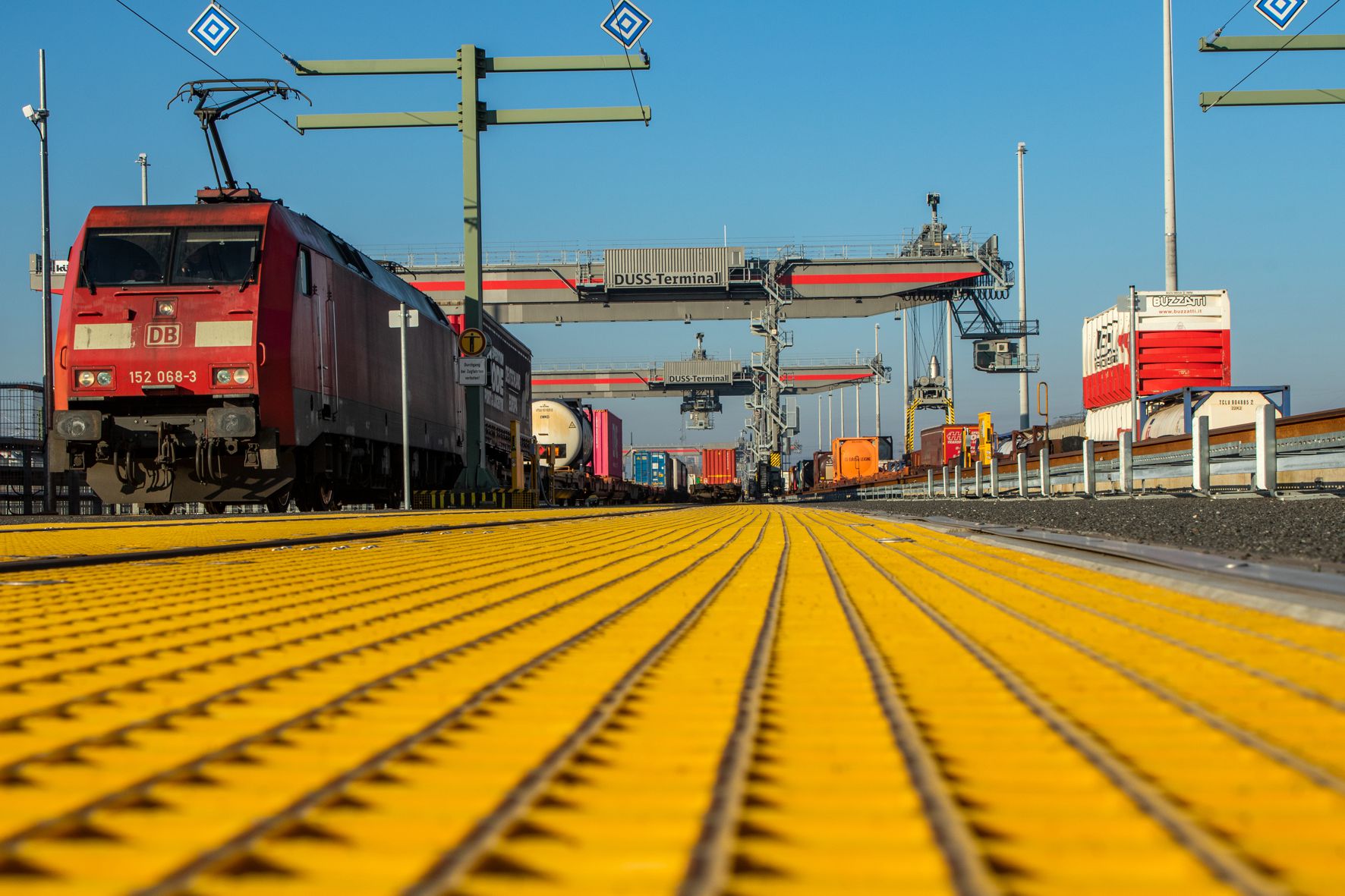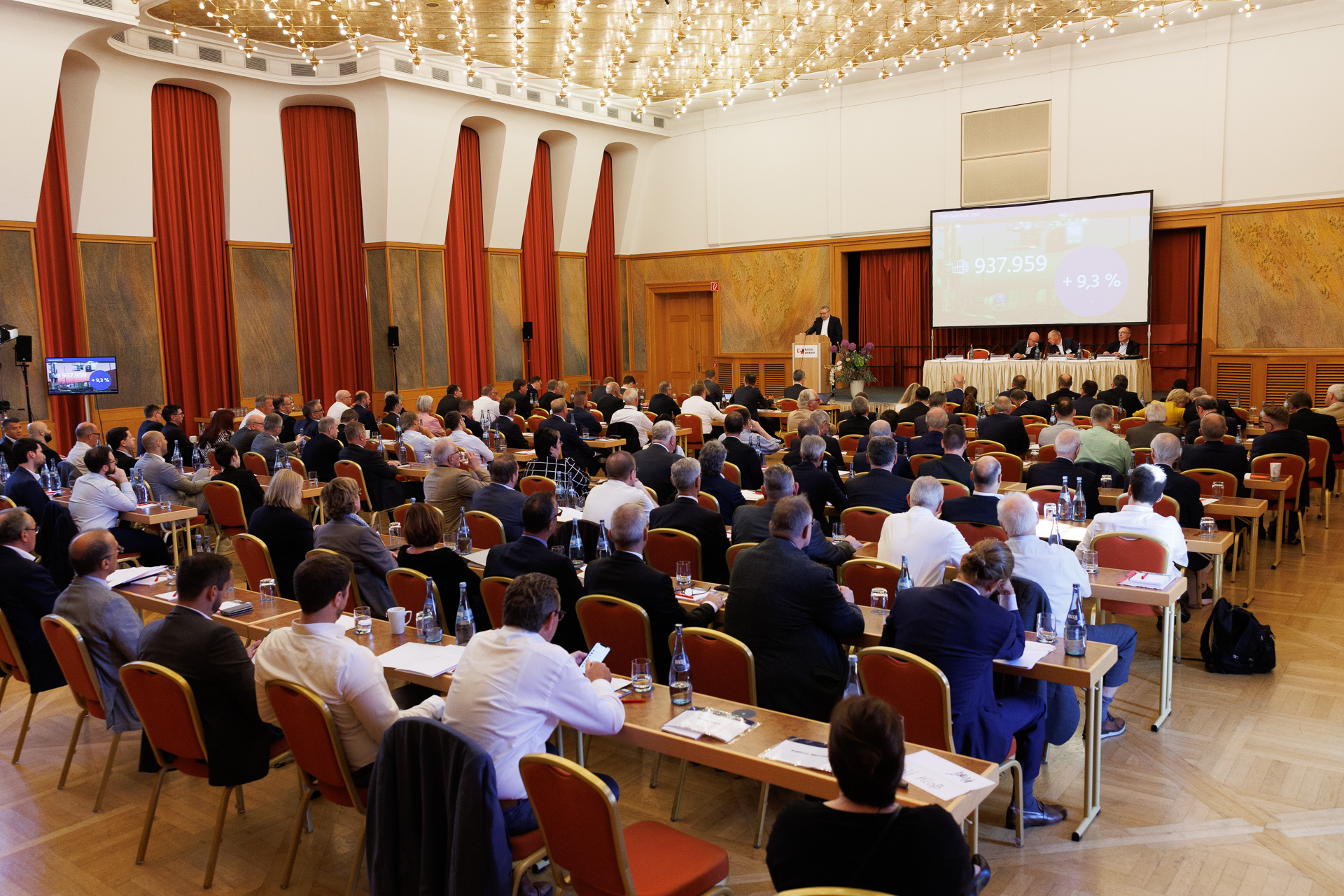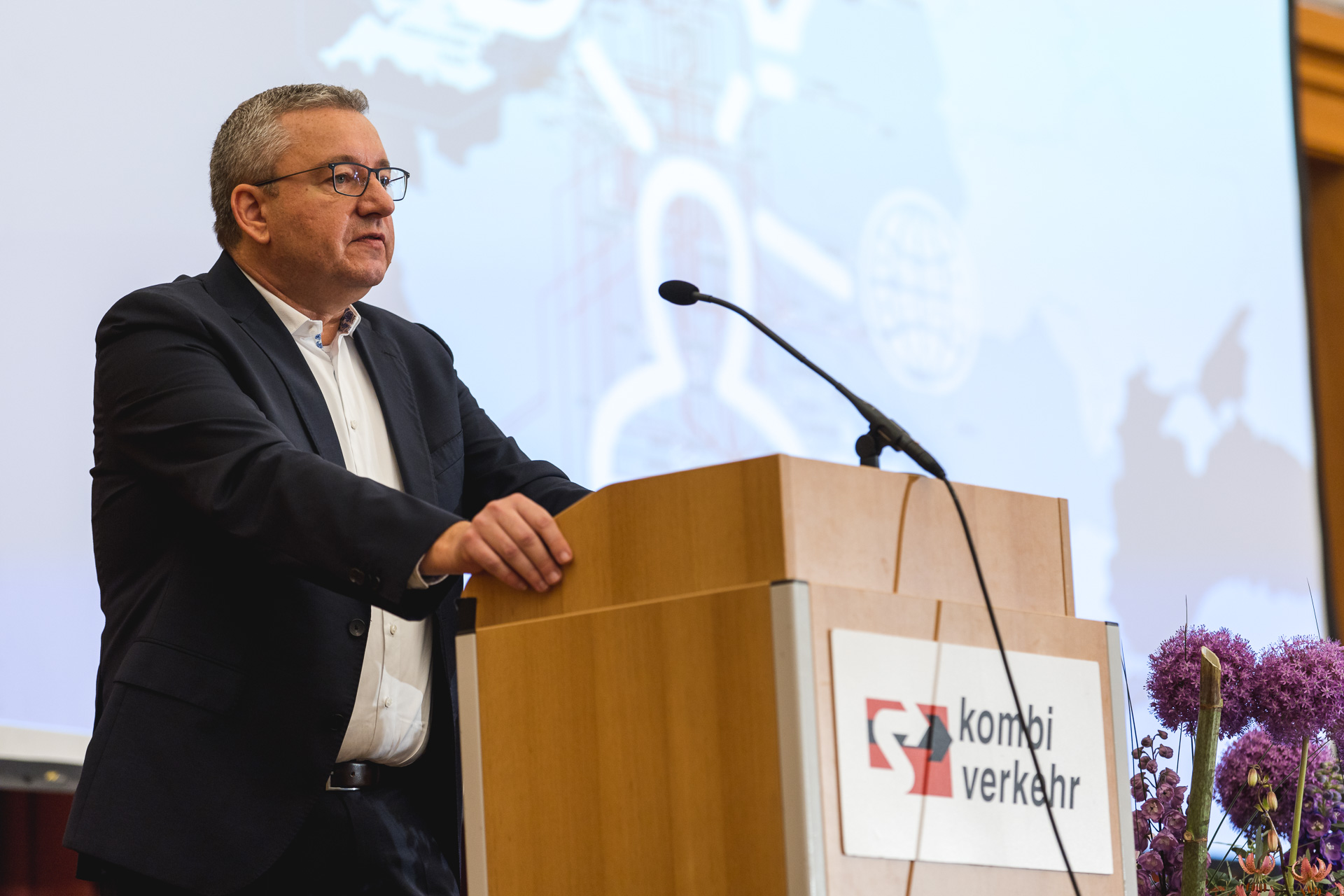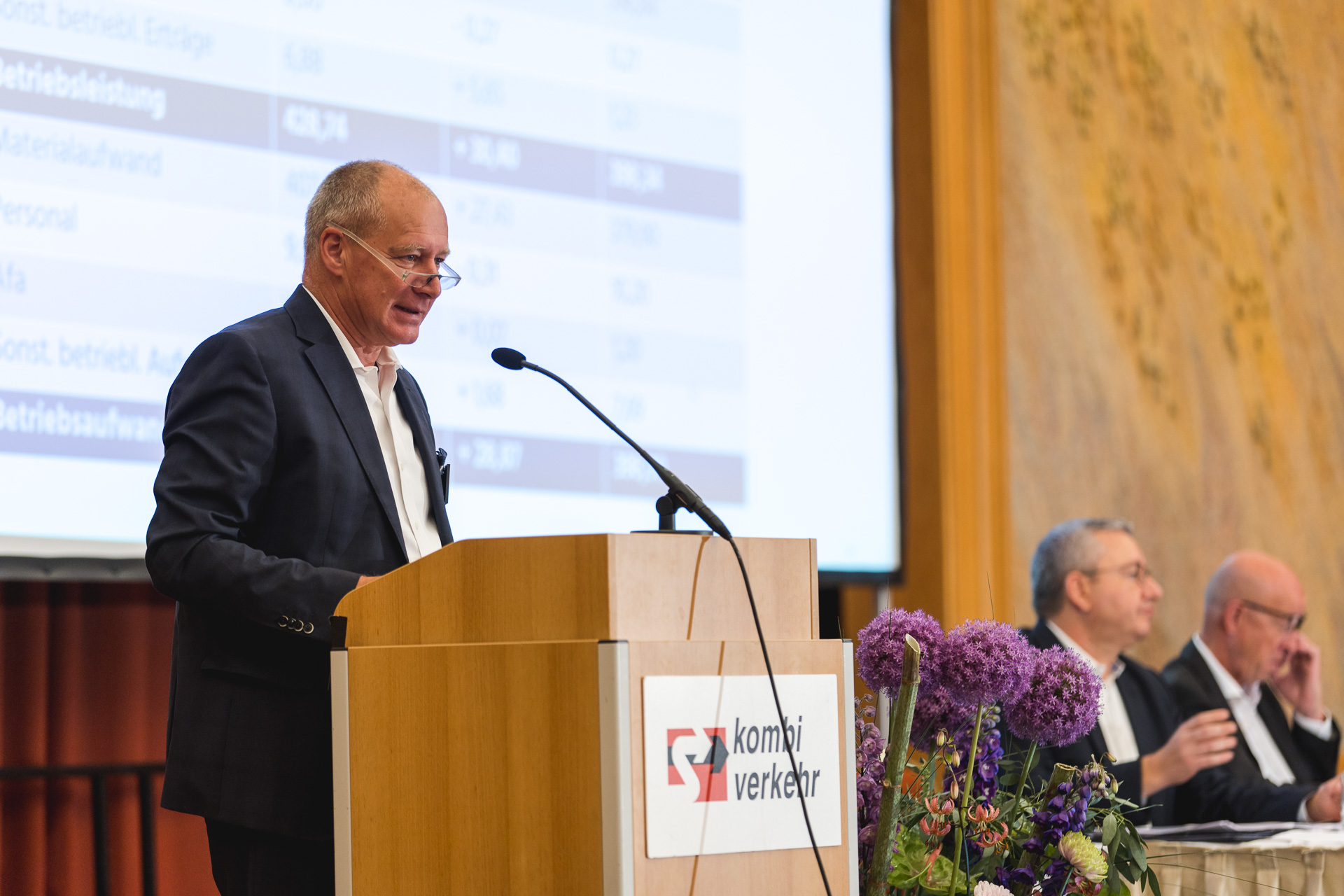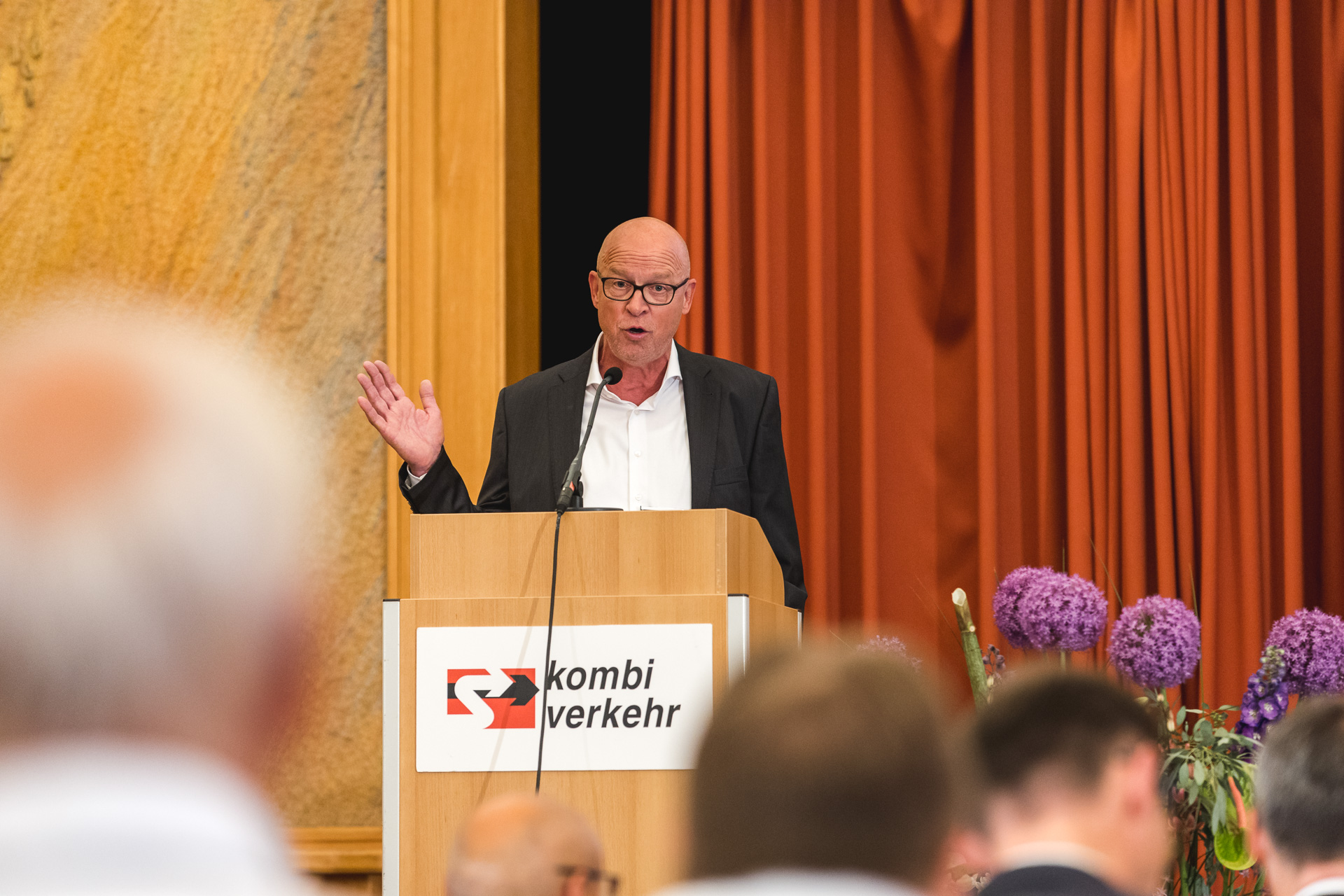- 2021 financial year: 937,959 trailers, containers and swap bodies transported
- MegaHub Hanover Lehrte and Mortara transport services enable growth in transport volumes
- Service quality the crucial sphere of activity, electricity costs brake called for
- New customer portal from autumn 2022, for easy entry into intermodal transport and for greater data transparency
- DXI launches CT 4.0 data hub marketing
(Frankfurt/Main, 22 June 2022) In the 2021 financial year, Kombiverkehr KG saw a gain of 9.3 per cent and a total of 937,959 (1.88 million TEU) truck consignments shifted to climate-friendly rail, thereby reaching the turning point in volume growth. The company provided information on this to the limited partners during today’s partners’ meeting. Significant gains were realised in the National and International Transport business fields. The keys to this included new services on the Germany/Benelux – Italy via Switzerland corridor, along with the new routing options via the MegaHub Hanover Lehrte rapid-transfer facility. The company’s most important sphere of activity is currently service quality, in close collaboration with the rail operators, in order to be able to continue offering Combined Transport as the most climate-friendly transport solution for logistics companies, industry and retail in Germany and Europe, in line with market requirements. In addition, a brake on electricity costs is aimed at cushioning the growing financial pressure on intermodal users and at providing a financial offset on the customer side as compensation due to quality-induced congested supply chains. The company achieved sales of 421.9 million euros in 2021. From autumn 2022, a new customer portal is intended to make access to Combined Transport and handling intermodal transports easier and even more transparent.
Climate protection: 3,700 trucks per night shifted onto sustainable rail
Kombiverkehr posted strong growth in total tonnage and transport output. The volume of transport carried on Kombiverkehr trains rose by 9.2 per cent, to a total of 22.16 million gross tonnes. Transport output actually improved by 10.2 per cent to 18.46 billion tonne-kilometres, with consignments transported an average distance of 833 km. By deciding to choose the intermodal transport solution with the main leg by rail in order to transport their goods, Kombiverkehr customers reduced carbon dioxide emissions by 1.1 million tonnes during 2021, thus making a valuable and sustainable contribution to protecting the environment. The consignments, delivered to the 110+ terminals on the network, removed 781 million vehicle kilometres from German and European long-distance road networks, equating to a daily average of 3,700 truck journeys shifted onto the railways over 251 days of operation.
More consignments in Germany and on practically all bilateral national routes
The total of nearly 80,000 additional consignments transported by Kombiverkehr in 2021 breaks down as over 25,000 truck units on the national network de.NETdirekt+ and as 55,000 consignments on the international network eu.NETdirekt+. The share of domestic transport in the company’s total volume rose to 20 per cent as a result. In total, 190,521 intermodal units were transported within Germany. This equates to an increase of 15.4 per cent compared with the previous year. The volume of cross-border transport rose by 7.9 per cent, from 693,021 consignments in 2020 to 747,438 consignments in 2021.
Development in the international business areas was varied. Whilst eastern and western Europe chalked up significant gains, volumes of consignments in transport to and from northern Europe fell slightly by 2.3 per cent. In the southern European market region we were able to make up for slight losses from the year before last. The Benelux-Italy sales region, newly installed in 2021, posted over 34,000 consignments to the year-end. “Demand for intermodal logistics services rose steeply between March and June compared to the previous year, before stabilising after the summer with growth rates in single digits. The effects of the coronavirus pandemic were far weaker in 2021 than in 2020. In addition, Germany- and Europe-wide, there was an economic recovery, even if it was less pronounced than was originally forecast,” says managing director Alexander Ochs, commenting on the annual results. “Nevertheless, it must be noted that more than 3,000 Kombiverkehr trains were cancelled during the past year as a result of disruptions to train operations. As a result, it was not possible to transport close on 90,000 truck consignments efficiently and sustainably by rail, using Kombiverkehr.” In the early months January to May 2022, the positive trend in consignments continued for the Frankfurt-based company. Even against the background of the global economic trends, the effects of disrupted supply chains due to lockdowns in Asia and the consequences of the war in Ukraine, the road-related challenges such as driver shortages and climate protection mean that there is no let-up currently in demand for intermodal transports: with over 418,000 truck consignments, the volume transported was around 8.0 per cent up.
MegaHub Lehrte contributes 36,000 truck consignments to the 2021 annual result
With the opening of the MegaHub Lehrte rapid-transfer facility in April of last year, Kombiverkehr has added a crucial component to the intermodal network. “In a commercially challenging time, we have succeeded in establishing Hanover in just a few months as a key hub. Today, we route many consignments in the gateway system to other economic centres in Germany and to neighbouring European countries. In addition, the Hanover region now has comprehensive access to international Combined Transport, and even locations that do not offer sufficient transport volumes for block trains can be connected to the intermodal network, via the bundling of transport units in the MegaHub onto trains bound for a specific destination,” says Ochs, summarising the current status quo and looking ahead to the future: “We see Hanover Lehrte as a big opportunity for capacity expansions. After having already connected international locations such as Verona, Rotterdam and Lovosice in the Czech Republic, in addition to some national terminals, we are currently working intensively on further connections aimed at supplementing the MegaHub offering.” More than 36,000 truck consignments were handled via the hub in Lower Saxony in the period from April to December 2021.
For better service quality in future: optimising international construction site management and urgent notification of the German Directive on Subsidising Terminal Infrastructure
For the operator’s forwarding customers, service quality is one of the most important criteria in the decision to shift their transports from road to rail. In recent months and even today, the rail infrastructure and the terminal capacities were and are the bottleneck in rail freight transport. The increased amount of construction work in the rail network is responsible for a disproportionately high number of train delays and cancellations, which in turn has an impact on personnel deployment planning, terminal slots and wagon runs. “What we are unfortunately experiencing at present no longer satisfies the expectations regarding the performance capability of rail. This situation must be resolved as quickly as possible,” states fellow managing director Armin Riedl. “While we welcome funding being made available at record levels for the modernisation, maintenance, reconstruction and upgrade of the rail network, we also simultaneously call on the government to make massive improvements in the execution of infrastructure measures designed to expand operations. We call on all stakeholders, and on the network operators in particular, to ensure that the infrastructure is no longer managed as it was in the past. Particularly with regard to the agreed climate goals, Combined Transport is a vital key. This is why we must do all we can to ensure its successful maintenance and expansion”, Riedl adds. This includes improved communication of construction measures and their effects, something which needs to be based on coordinated and targeted construction site management. In addition, during construction operations corridors and alternative routes, including on international routes on both sides of the country borders, must be kept open as much as possible, to ensure that the site traffic can keep flowing. On the terminals side, replacement investment must be undertaken. Accordingly, the operator is committed to pressing to ensure that the German Directive on Subsidising Terminal Infrastructure for Combined Transport Facilities of Non-Federally Owned Enterprises is now submitted as quickly as possible to the European Commission for notification. “In order to avoid a funding vacuum, the Commission recently approved a request by the federal government to extend the period of validity of the old directive without changing its content, although this only applies up to 30 September 2022. Unfortunately, the uncertain legal situation is delaying desperately-needed investment in modernisation work, so there are no guarantees as to the functionality of track and systems technology at the terminals over the coming years”, Riedl clarifies.
Compensating cancellation costs and introducing an electricity costs brake
With regard to the quality-related effects in the day-to-day business of the forwarders, Riedl called at the meeting for compensation of costs for users of intermodal transport. “If the forwarders are to continue to keep rail as a vital component in transport chains and invest in the Combined Transport system long-term, having regard to the Green Deal, then it is now high time to compensate for the high cancellation costs and also the high replacement investment. We cannot allow the current problems of the network and rail companies to fundamentally call into question the use of intermodal transport and the future viability of the overall system.” At the same time, Riedl also made reference to the energy costs of the rail companies, which are reflected in the price offers from the operators and which must ultimately be paid by forwarders. According to Riedl, the costs for energy have tripled in the past two years – something which cannot be rolled back again so quickly, given the background of the war in Ukraine: “Today, rail is paying the highest charges for energy taxes, energy levies and fees in freight transport. They are 8.33 cents per kilowatt hour, according to the Allianz Pro Schiene (“Pro Rail Alliance”) – 2.68 cents more than diesel trucks and 6.39 cents more than LNG trucks. This price trend can only be stopped by an electricity price brake, which needs to be prepared and brought in by the federal government as quickly as possible.”
New customer portal from autumn 2022, for easy entry into intermodal transport and for greater data transparency in scheduling
For forwarding customers who do not exchange their order data via a B2B interface, Kombiverkehr KG is expanding its offer of digital applications in the comprehensively revised and access-protected customer portal meinKombiverkehr, which will be available to customers from autumn 2022. In addition to modern online timetable information, the new portal includes a central order overview with fully detailed information on the respective transport status. All orders can be edited, and transport runs are displayed via a new tracking & tracing function that includes estimated time of pick-up. The current online booking is being integrated into the portal and simplified. Schedulers will also find full information on intermodal order processing. “With the new customer portal, we will raise our service to a new level. Booking, monitoring and managing transports with Kombiverkehr will be even easier in future, and the transparency of the information will be greatly increased,” says Ochs, commenting on the added value from the new applications: “In addition to our existing customers, new customers will also benefit from this particularly as they shift their goods and merchandise from road to rail for the first time and require rapid, web-based support for the occasional question when doing so.”
DX Intermodal launches CT 4.0 data hub marketing
After a three-year project period and a further year in preparation, the erstwhile research project “Digitalisation of intermodal supply chains - CT 4.0” has now finally accomplished the transition to practical implementation. The marketing of the data hub is set to launch soon, via the new company DX Intermodal GmbH – a joint venture involving the six partners (Hoyer Group, Hupac Intermodal, Kombiterminal Ludwigshafen, Lokomotion, Paneuropa Transport and Kombiverkehr). “Our new associated company will now actively approach all companies being considered for technical connection to the data hub. These include forwarders, terminals, rail transport companies and also operators,” Riedl announced to the partners present. The advantages of the new data hub are a consistent data format via EDIGES, clear consignment identification operating Europe-wide, and above all the fact that users gain access to full information from all actors in the intermodal transport chain by launching just one data interface.
A key cornerstone of Kombiverkehr KG today and in the future: the MegaHub Hanover Lehrte rapid-transfer facility, which with over 36,000 truck consignments had a significant share of the total volume of around 940,000 truck consignments in the 2021 financial year.
The press photo can be downloaded here.
Shareholder meeting 2022
The press photo can be downloaded here.
Managing director Alexander Ochs
The press photo can be downloaded here.
Managing director Armin Riedl
The press photo can be downloaded here.
Chair of administrative board Hermann Lanfer
The press photo can be downloaded here.
2021 key figures of Kombiverkehr KG at a glance:
|
Total truck consignments transported |
937,959 |
|
International truck consignments |
747,438 |
|
National truck consignments |
190,521 |
|
Total consignment volume in TEU |
1.88 million |
|
Savings in carbon dioxide emissions in metric tons compared with end-to-end road transport |
1.1 million |
|
Transport volume in gross metric tons |
22.16 million |
|
Average transport distance |
833 km |
|
Goods volume in ton kilometres (tkm) |
18.46 billion |
|
Sales in EUR |
421.9 million |
|
Employees (full-time) |
120 |
The 2021 annual report offers an extensive presentation of the business results of Kombiverkehr KG.
Thank you very much for your enquiry! The desired timetable will be available soon for download. When you click on the "Create timetable" link below, the data will be retrieved from our web server, which means that the information is always up to date. If you are registered for myKOMBIVERKEHR you have access to the “Personal timetable booklets” online application. So you can make use of this service in an extended and individualised way. For more about this, please click here.
Create timetable booklet




